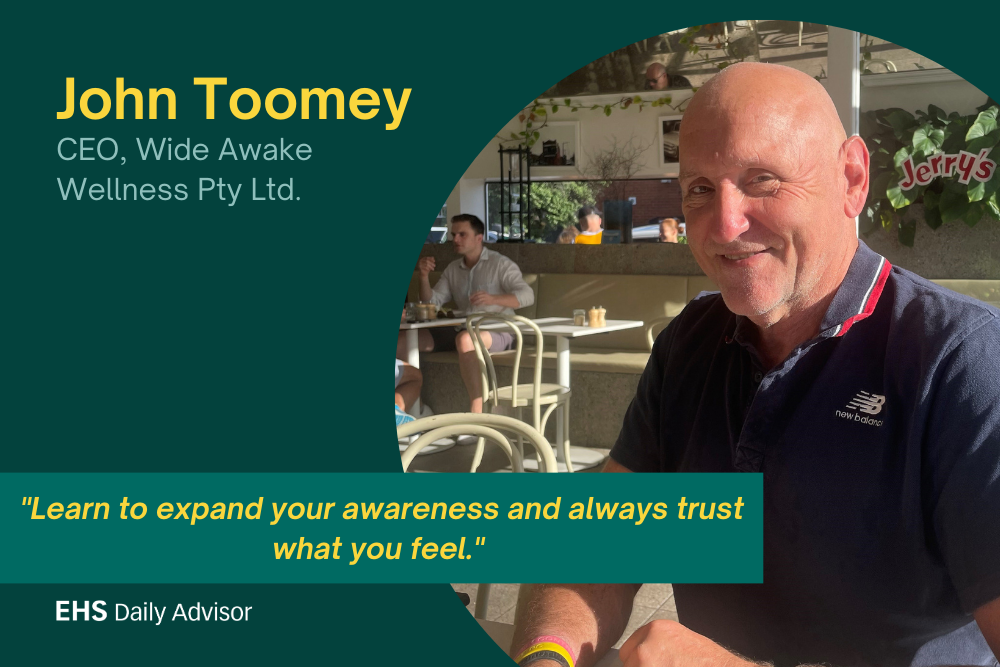John Toomey is an international speaker, writer, and thought leader. He has a background in high performance roles in professional sport, including seven Australian Rules Football clubs, and culture development roles in two A league soccer clubs, and as coach of an Olympic gold medalist. He holds a physical education (PE) degree from Deakin University, did his master’s studies in applied physiology at Victoria University, studied and taught human consciousness as an Avatar Master for 15 years, is a published author, and has lectured at multiple universities in PE and medicine. He served for five years on RMIT University’s School of Health Sciences Program Advisory Committee.
In 2012, John was invited to deliver education of fatigue to a mining company workforce. The work was received with such enthusiasm that he was soon presenting his unique program of fatigue prevention education. Eventually, he began incorporating resilience and mental wellbeing for workers into his offerings. His topics have been presented hundreds of times to diverse blue-collar workforces. He’s delivered over 3,500 corporate presentations, spoken at conferences worldwide, written two books and hundreds of published articles, completed four national thought leadership tours in Australia, and appeared on multiple podcasts globally.
Currently, John is Global Chair of the Global Wellness Institute’s Workplace Wellbeing Initiative, the world’s premier advisory group on workplace wellness. He is also the CEO of Wide Awake Wellness Pty Ltd., an education and content creation agency whose goal is to provide broad ranging education in workplaces to inform, educate, and empower all people to discover new ways of achieving more positive wellbeing.
For our latest Faces of EHS profile, we sat down with John to discuss his biggest influences, the importance of having humility as a supervisor, and presenting ESG in a more genuine way.
Q: How did you get your start in the field?
I was invited to present on fatigue at a mining company in 2012. I had already been educating workforces in general about health, wellbeing, stress, and work life balance. This invitation introduced me to the profound need for education in blue collar industries.
Q: Who has been your biggest influence in the industry?
Perhaps the Workers Compensation and Risk team at QBE Insurance. When they saw my work, they promoted me onto four national thought leadership tours. It exposed my work to huge segments of industry. Paul Hardiman and Debra Corden were significant players in that quest. Debra still heads up that division for QBE in Australia.
Q: What’s your best mistake and what did you learn from it?
What a great question. I was delivering a seminar to a workforce and there were no leaders in the room. One worker decided to challenge everything I said. Eventually, I put him in his place, and it didn’t go down well for me as he then issued a complaint against me for embarrassing him (which is what he was trying to do to me). The safety manager at the company was not a strong person and decided to cease using my services. Now I refuse to present if there is not a senior leader in the room.
Q: What’s your favorite and least favorite part about working in the industry? Would you change anything?
My favourite thing is the connection with the workforce. If I could change anything, it would be to get access to more time to connect with workers one-on-one to personally answer their more private questions.
Q: What are your thoughts on safety culture? How can company leaders make safety a value within their organization?
By appealing to the workforce’s sense of care. Everyone has it. It is a part of their humanity, and it reveals itself during times of crisis. Delivering an inspiring education program that awakens that deep desire to care is a game changer.
Q: What safety concerns or issues do you think need more prioritization in EHS programs?
The abuse of power by supervisors. Often, when people are given a little power, they can become a little drunk on their own fumes and turn into tyrants. They have not learned that their role is to serve, not command and dominate. This can wreck a culture. More training is needed to ensure supervisors retain their humility.
Q: What will be the impact of Environmental, Social, and Governance (ESG) principles on the EHS industry?
If introduced the right way, with a genuine intention to open people’s awareness, then it will be a good thing. Potentially, it can add a deeper level of meaning and value to someone’s work when they become more aware of the impact they have on their society. But if it is introduced as some form of corporate virtue signaling, it will not be taken seriously and could become a workplace culture disaster.
Q: How will new safety technologies influence the work being done by EHS professionals?
I think AI may help produce more educational content. I’m not really sure about the rest. Certainly, advanced drug screening procedures will be helpful.
Q: What are you most proud of?
Through my own persistence over about a four-year period, I singlehandedly changed the vernacular in industry from fatigue management to fatigue prevention. It was a real mindset shift for the whole industry. Also, I’m very proud of my book, “In it for The Long Haul.”
Q: Do you have any advice for people entering the profession?
Yes. Learn to expand your awareness and always trust what you feel. Sometimes we get an intuitive hit on something, and if we wait around second guessing it, someone will get hurt.
Q: Anything else you’d like to add?
I think it is crucial that we stop viewing men as being resistant and non-conforming. Men need to understand things. Education that respects their intelligence and informs them, helping them to understand, will bring forth their enthusiasm, commitment and loyalty. It is good to support men to redevelop healthy masculinity and to celebrate it.


